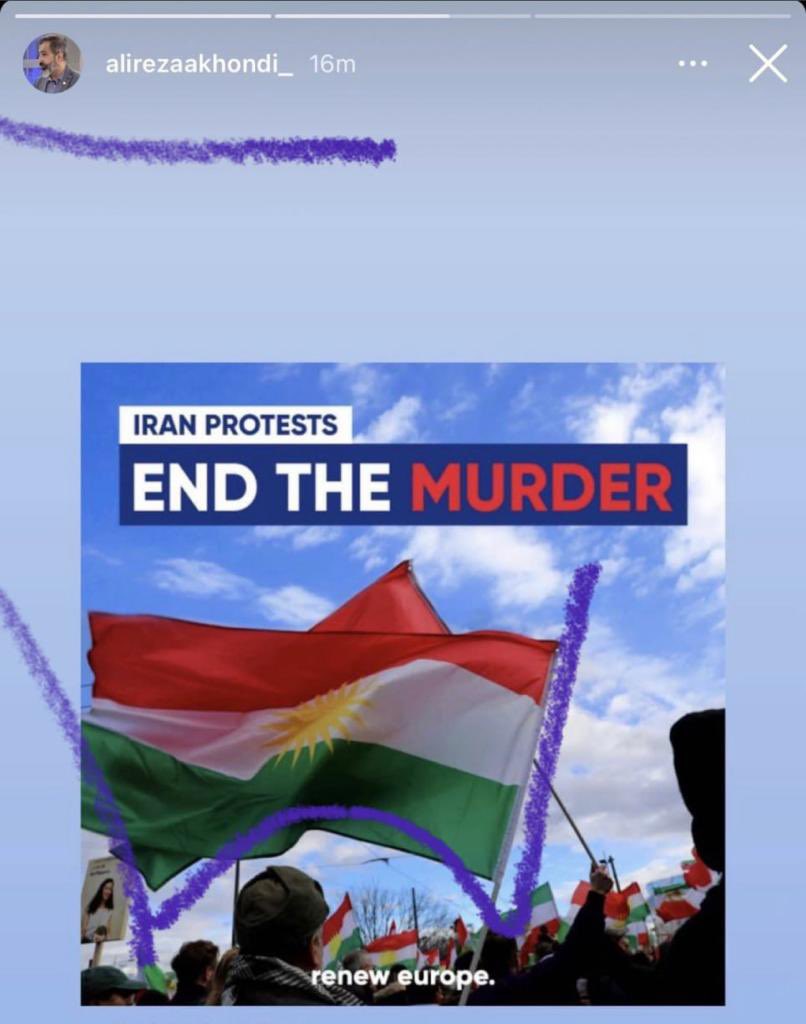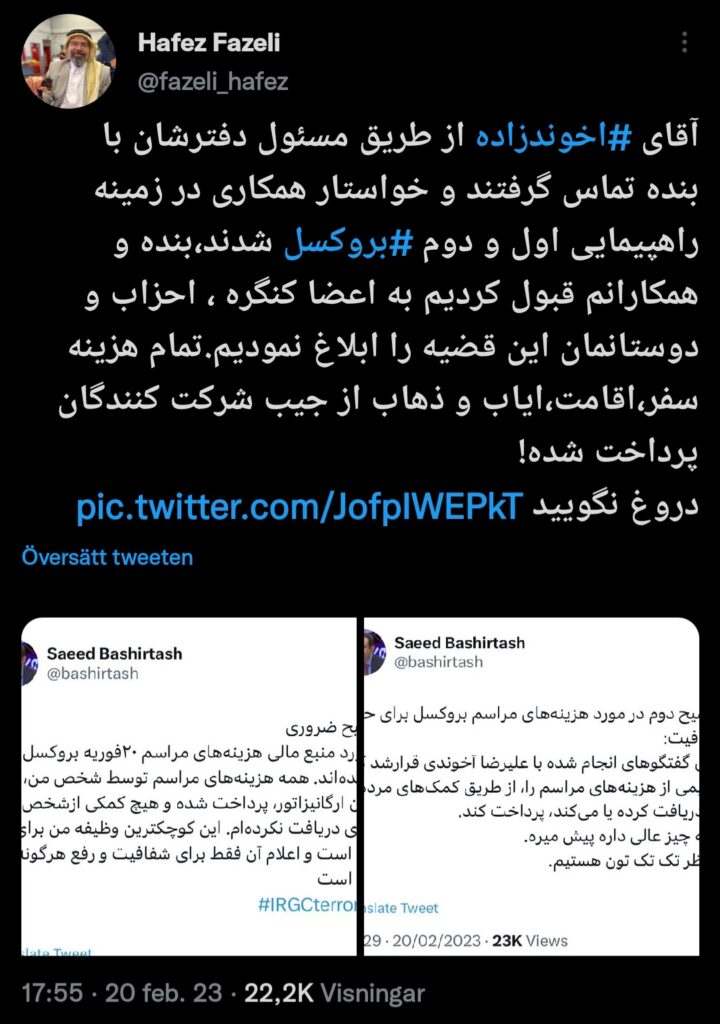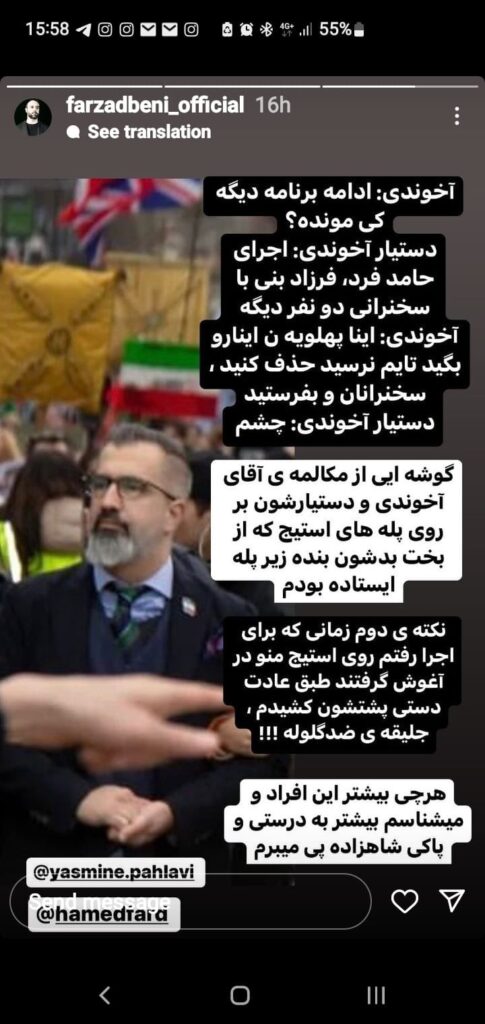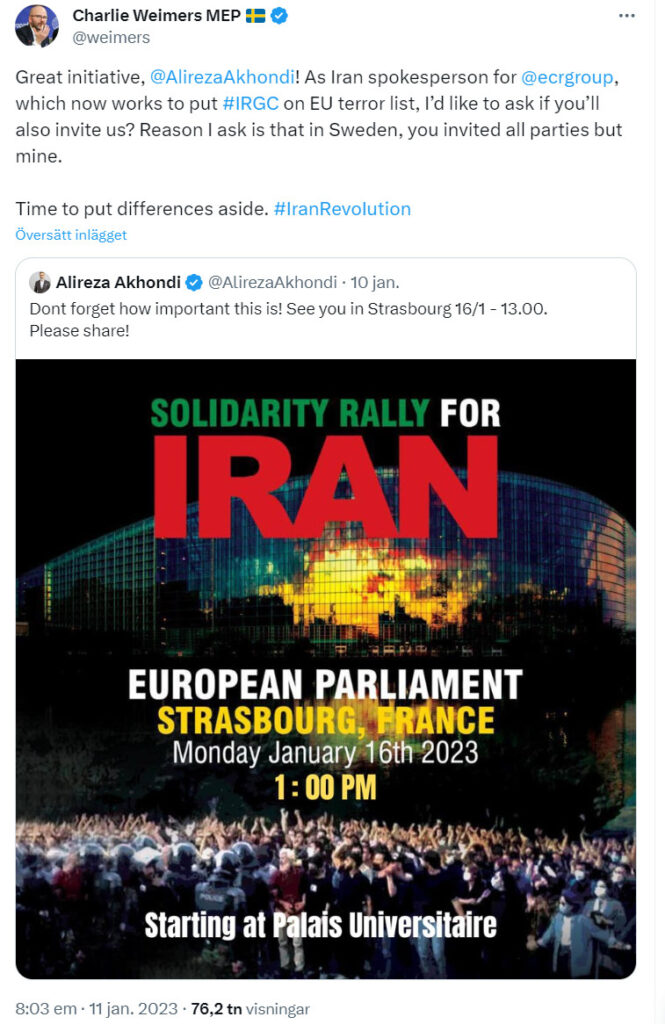In the last months, I have faced immense pressure from my Iranian compatriots because of my silence on the activities of Mr. Ali Reza Akhondi, a Member of Parliament in Sweden. As a staunch opponent of the Islamic regime in Iran, my silence might seem unusual. However, it was because of my fundamental belief in that every individual, regardless of race, sexuality, or ideology, deserves respect for their beliefs and must not be subject to unwarranted personal attacks.
My silence was also an act of respect, ensuring that nothing overshadowed the anniversary of Mahsa Amini’s tragic murder on September 16. However, the time has now come to write about my concerns, prompted by serious allegations and documented evidence regarding Mr. Akhondi’s affiliations and political maneuverings, which I have meticulously reviewed in recent weeks.
In raising this subject, I emphasize the utmost importance of maintaining respect and avoiding personal libels. Our aim should be a constructive dialog that acknowledges legal frameworks and ethical norms, fostering a climate where healthy, democratic debate thrives.
A Disturbing Silence and Sudden Visibility
My critique of Mr. Akhondi begins with his political trajectory. Throughout his tenure in Swedish politics, he has clearly avoided condemning the Islamic regime in Iran. His absence from regime-critical gatherings and silence in public discourse were unmissable. It raises eyebrows that amidst the national grief and uproar following Mahsa Amini’s death, Mr. Akhondi vaulted into the limelight. His sudden high-profile stance, with questionable associations and actions, casts a shadow on his motivations.
Troubling Ties with Separatist Movements
Mr. Akhondi’s apparent connections with separatist, and potentially extremist, factions are deeply troubling. His decision to post the flag of Iraqi Kurdistan on social media [first image to the left] at a time when the whole of Iran had risen in unity was a provocative move. Instead of showing solidarity with a united Iran, he chose to display symbols that, unfortunately, resonate with Kurdish separatist organizations. Furthermore, Mr. Akhondi has arranged demonstrations where separatists have been given a platform to speak and he has also allegedly collaborated with such elements [second image to the left]. These actions, whether careless or calculated, go beyond mere oversight and warrant scrutiny.
Inconsistent Allegiances
In the wake of criticism for displaying the flag of Iraqi Kurdistan, Mr. Akhondi faced a new wave of backlash following his attempt to clarify his allegiances. He posted a clip on Instagram, asserting his role as a member of Sweden’s parliament and affirming his commitment solely to the Swedish flag. This declaration, rather than quelling discontent, ignited further controversy among the Iranian diaspora.
Many Iranians were stunned and offended by this proclamation. They questioned why Mr. Akhondi, acknowledging allegiance only to Sweden, should interfere in Iranian affairs. His words, they argued, betrayed a disconnect with the Iranian struggle and suggested a convenience of association that many found distasteful.
Responding to this, Mr. Akhondi appeared to reverse his stance, this time adorning his attire with a pin of the traditional Iranian flag, featuring the lion and sun [image to the left], symbols deeply rooted in Iran’s history and culture. This quick pivot, rather than demonstrating solidarity, highlighted a demagogical approach. It suggested a willingness to shift allegiances—or at least, the appearance of allegiances—based on public sentiment.
This inconsistency has raised concerns about Mr. Akhondi’s reliability as a representative for Iranian interests. It seems he is influenced by the tide of public opinion, altering his stance to suit the prevailing winds. Such inconstancy is concerning, particularly for someone in his position. It invites mistrust and doubt, undermining his credibility. True representation demands steadfastness in principles.
Mr. Akhondi’s actions have shown that his positions might not be as firmly rooted as they should be for someone bearing the dual responsibility of representing constituencies in both Sweden and the broader Iranian community. The incident with the flag symbolism serves as a microcosm, illustrating larger concerns about his political consistency and integrity.
Censorship and Selective Solidarity
Reports and testimonies, including revelations by the Iranian singer Farzad Beni [see image to the right], suggest Mr. Akhondi’s gatherings were not bastions of free speech. Individuals perceived as supporters of Crown Prince Reza Pahlavi faced alleged censorship. In our struggle for unity and freedom, silencing voices is a disservice, undermining the principles we collectively uphold.
Political Intrigues Over National Interests
Further, Mr. Akhondi’s reluctance to collaborate with outspoken supporters of the Iranian people, such as Member of the European Parliament Charlie Weimers [see image to the left], hints at a preference for political intrigue over Iran’s liberation. It is highly disappointing when personal agendas supersede the collective cause.
Unfounded Assertions and the Quest for Attention
During a conference on the IRGC in January 2023, in Stockholm, where I was a speaker, Mr. Akhondi was in attendance. Despite not being a scheduled speaker, he insisted, through his entourage, on having a platform. He eventually spoke, asserting that the opposition had merely six months to a year to overthrow the Islamic regime, as post this timeframe, it would become impossible due to the regime’s potential acquisition of a nuclear bomb. Now, in November 2023, ten months later, his claim has been disproven. Such fearmongering, whether arising from misinformation, flawed intelligence, or incorrect analysis, is irresponsible. It misleads the public and inadvertently fortifies the regime we all stand against.
Financial Transparency
The Iranian diaspora on social media has been alive with activity following Mr. Akhondi’s publication of a detailed account of funds he has gathered and a comprehensive report of his expenditures. The report includes specifics such as dates, venues, categories of expenses, and the amounts spent, provided in both foreign and Swedish currencies. However, Mr. Akhondi did not disclose any receipts, making it impossible to verify the exact nature of the expenses.
Shortly thereafter, alleged receipts were leaked, displaying precise details—dates, locations, and amounts—that had also been recorded by Mr. Akhondi in his financial report. These receipts indicated that the donations, contributed voluntarily by supporters, were expended on various items including a new mobile phone, alcoholic beverages at restaurants, skincare products, and women’s lingerie.
Furthermore, according to the financial report available on Mr. Akhondi’s website, it appears that he (and potentially his travel companions, though this is not clear) experienced a loss of baggage. While the specific circumstances are vague, this incident might explain why Mr. Akhondi, as per the alleged receipts, made clothing purchases among other things. However, numerous questions remain unanswered. Was his luggage ever recovered? Should donors cover the cost of items that he would otherwise have needed to purchase anyway? Did he engage with his insurance provider, and did he receive any compensation from them?
The financial statement released by Mr. Akhondi indicates that a portion of the funds raised was allocated for travel expenses. It is worth noting that in Sweden, parliamentarians are provided with a designated travel budget. The question arises as to why Mr. Akhondi did not utilize this allotted budget for his political journeys. Furthermore, it remains unclear whether he may have expended those funds in addition to the collected money.
Seeking to initiate a dialogue and understand the situation better, I contacted Mr. Akhondi via email on October 26, at his official address at the Swedish Parliament. My message read:
Hello Alireza,
My name is Ardavan, and I am in the process of drafting a critical article about your political activities concerning the Iran issue. One of the points I will discuss is the recent allegations that the funds you raised were spent on expensive restaurant visits, skincare products, and women’s lingerie.I have visited your website, www.alirezaakhondi.com, and reviewed the PDF file you posted under ‘Financial Transparency.’ The file is 46 pages long, and I would like to request access to three specific receipts because a PDF with just dates and amounts is not particularly valuable. Therefore, I kindly ask you to disclose three receipts to me and the public:
February 26, 2023, Geneva, Grocery, CHF 38.60 = 444.67 SEK
February 26, 2023, Geneva, Restaurant, CHF 321.70 = 3705.98 SEK
February 26, 2023, Geneva, Shopping, CHF 229.10 = 2639.23 SEKIn my article, I will note that I have reached out to you via email.
I look forward to hearing from you soon.With kindest regards, Ardavan
In response, rather than addressing my inquiries about the three receipts, Mr. Akhondi not only threatened legal action but also accused me of collaborating with the Islamic regime in Iran. His response was as follows [translated from Swedish]:
It’s interesting that you wish to write an article about ‘allegations’ that you have evidently played a part in fabricating. You are free to write whatever you want. I am also free to take the necessary legal actions against the defamation and smear campaign that you are clearly a part of. And yes, I have seen your posts. Every collected krona can be accounted for, and beyond that, there are expenses of nearly half a million that I have paid out of my own pocket. You are obviously running errands for the mullahs. We have nothing to discuss.
It is profoundly regrettable that a member of the Swedish Parliament cannot withstand scrutiny. My email, which was highly transparent, aimed to clarify the situation and engage Mr. Akhondi in further discussion, an opportunity he dismissed, as evidenced by his hostile response. Moreover, it is intriguing that he accuses me of participating in this so-called conspiracy against him, despite me having never previously written about his financial dealings.
Individuals who enter politics, especially those who become members of parliament and public figures who raise funds, must be open to scrutiny.
Mr. Akhondi should uphold transparency and provide a complete list of all income and expenses, along with their corresponding receipts. This is of utmost importance, not least because of his role as a member of parliament, as also pointed out by Mr. Nima Gholam Ali Pour, another parliament member in Sweden.
A Disturbing Advocacy for War
Lastly, Mr. Akhondi’s association with the United Against Nuclear Iran and the endorsement of military action against Iran is antithetical to our goals as stated by His Majesty Reza Shah II over and over again. Advocating violence betrays our pursuit of peace and freedom. This incident further demonstrates that Mr. Akhondi does not have Iran’s best interests at heart. This scenario is further convoluted by the connection between notable figures within UANI and the political sect Mujahedin-e Khalq (MEK), a political faction widely despised in Iran. Notably, UANI’s chairman Joe Lieberman, along with board members like John Bolton, Francis Townsend, and Bill Richardson (deceased), have all wholeheartedly supported MEK. These associations further muddle Mr. Akhondi’s allegiances, raising more questions about the integrity of his advocacy.
Concluding Reflections
The situation surrounding Mr. Ali Reza Akhondi underscores the necessity of accountability in public life. His actions, marked by controversial gestures and questionable affiliations, highlight the scrutiny that inevitably follows those who step into the public arena. The unfolding of events suggests that Mr. Akhondi’s credibility has suffered a blow from which recovery may be impossible, signalling an unspoken conclusion to his current trajectory in the political landscape.
However, in the broader context, Mr. Akhondi’s journey serves as a poignant lesson. It is a reminder that public figures are transient custodians of trust, and any deviation from the principles of transparency, integrity, and consistency can irreparably tarnish their standing. This episode is not simply about an individual’s fall from grace but a testament to the fact that public sentiment and trust are earned through a steadfast commitment to one’s professed values, and once lost, they are not easily regained.





